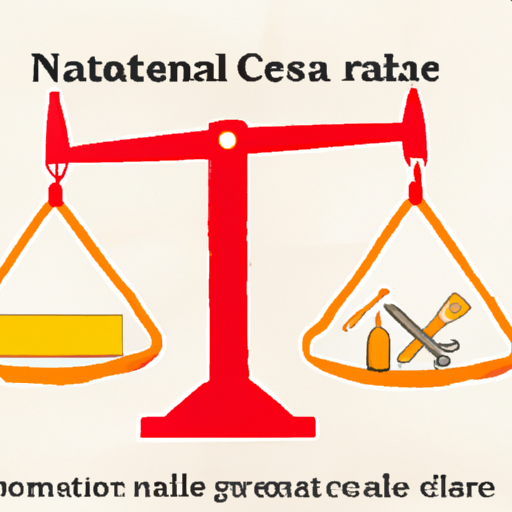Have you ever found yourself searching through countless websites and documents to try and find specific regulations for a particular region? It can be a frustrating and time-consuming process. However, there is good news – there are resources available that compile regional regulations for easy access. These resources are designed to streamline the research process and provide you with all the information you need in one convenient location. Whether you are a business owner, a lawyer, or simply a curious individual, having access to these compiled regional regulations can save you time, effort, and headaches. So, let’s explore the availability of such resources and how they can benefit you.
Overview of regional regulations
Understanding regional regulations
Regional regulations refer to laws and rules implemented by specific geographic areas or regions within a country. These regulations are designed to address the unique challenges and needs of a particular region. They cover a wide range of subjects, including economic development, environmental protection, public safety, and consumer rights. Understanding regional regulations is crucial for individuals, businesses, and organizations operating within these regions.
Importance of regional regulations
Regional regulations play a vital role in ensuring the orderly development and operation of a specific geographic area. They help maintain social harmony, protect the environment, and promote economic growth. By addressing the specific needs and concerns of a region, these regulations provide a framework for sustainable development and responsible governance. Adhering to regional regulations is essential for avoiding legal repercussions and building trust within the community.
Challenges of accessing regional regulations
Accessing regional regulations can be challenging due to several factors. Firstly, regional regulations may be scattered across various government websites, making it time-consuming and frustrating to locate and gather the necessary information. Additionally, the language used in these regulations may be complex and filled with legal jargon, creating barriers for individuals unfamiliar with the legal terminology. Lack of awareness about available resources and the absence of a centralized repository further complicate the process of accessing regional regulations.
Need for easy access to regional regulations
The need for easy access to regional regulations is paramount for individuals, businesses, and organizations seeking to comply with the legal requirements of a specific region. It helps promote transparency, simplify the compliance process, and reduce the risk of legal violations. By providing a centralized platform or resource that compiles regional regulations, individuals and organizations can save time, enhance efficiency, and ensure that they are operating within the boundaries of the law.
Existing resources for regional regulations
Government websites
Government websites are a primary source of information for regional regulations. These websites, maintained by governmental agencies or departments, often provide access to the latest laws, regulations, and guidelines. They offer valuable information on various subjects, including business licensing, environmental protection, labor laws, and taxation. Government websites are generally free to access, and the information provided is reliable and authoritative.
Regional regulatory databases
Regional regulatory databases serve as comprehensive repositories of regional legislation and regulations. These databases collect, categorize, and update laws and regulations from various regions, making it easier to search and access the relevant information. They often provide advanced search features, allowing users to filter results based on specific criteria. Regional regulatory databases are particularly useful for researchers, legal professionals, and businesses operating in multiple regions.
Legal research platforms
Legal research platforms are online tools or software that provide comprehensive legal information and resources. These platforms often include databases of regional regulations, along with other legal materials such as case law, statutes, and legal commentary. They offer advanced search capabilities, making it easier to find specific regional regulations. Legal research platforms are widely used by legal professionals, researchers, and individuals seeking in-depth analysis and interpretation of regional regulations.
International organizations’ websites
International organizations play a significant role in compiling and disseminating regional regulations. These organizations, such as the United Nations and regional bodies like the European Union or ASEAN, often maintain dedicated websites that provide access to regional regulations. They serve as trusted sources of information and offer a broader perspective on regional regulations. International organizations’ websites are particularly beneficial for individuals and businesses operating across multiple regions or seeking a global understanding of regulatory frameworks.
Government websites
Types of government websites
Government websites can be broadly categorized into national, regional, and local levels. National government websites serve as central repositories for legislation and regulations applicable to the entire country. Regional government websites, on the other hand, focus on regulations specific to a particular geographic region within the country. Local government websites provide information on regulations applicable to a specific city, town, or municipality.
Availability of regional regulations on government websites
Government websites often provide access to regional regulations through dedicated sections or portals. These sections typically contain links to regional legislation, regulations, and administrative guidelines. However, availability and ease of access may vary across different government websites. Some websites may provide comprehensive and up-to-date information, while others may have outdated or limited resources. It is essential to consult the designated regional government website for accurate and current regional regulations.
Pros and cons of using government websites
One of the significant advantages of using government websites is the reliability and authenticity of the information available. Government websites are official sources of regional regulations, ensuring that the information provided is accurate and up-to-date. Moreover, these resources are generally free to access, making them accessible to a wide range of users. However, government websites can sometimes be challenging to navigate, especially for individuals unfamiliar with the structure and layout. The sheer volume of information can also be overwhelming, requiring users to invest time and effort in finding the relevant regional regulations.
Tips for navigating government websites
Navigating government websites can be made easier with a few simple tips. Firstly, familiarize yourself with the structure and organization of the website. Identify the sections or portals dedicated to regional regulations. Additionally, use the search functionality available on the website to enter relevant keywords or phrases. Take advantage of any filters or advanced search options provided to narrow down search results. Finally, consider bookmarking important pages or creating shortcuts for quick access to frequently referenced regional regulations.
Regional regulatory databases
Overview of regional regulatory databases
Regional regulatory databases are comprehensive repositories that collect and organize regional legislation and regulations from different geographic areas. These databases aim to provide a centralized platform for accessing regional regulations, making it easier to search, browse, and compare regulations across different regions. They often categorize the regulations based on subject matter or region, enhancing the efficiency of information retrieval.
Examples of popular regional regulatory databases
There are various regional regulatory databases available that cater to different regions and jurisdictions. One prominent example is the European Union’s EUR-Lex database, which offers access to EU legislation, including regional regulations, directives, and decisions. Another example is the Asian Development Bank’s (ADB) Compliance Review Panel database, providing access to regional regulations related to environmental and social safeguards in ADB-funded projects. These databases demonstrate the diversity and scope of regional regulatory databases available.
Features and benefits of regional regulatory databases
Regional regulatory databases offer several features and benefits that make accessing regional regulations more convenient and efficient. They provide advanced search functionalities, allowing users to search for specific regulations based on keywords, dates, regions, or subject matter. They also offer browsing options, enabling users to explore regulations by region or topic. Furthermore, these databases often provide summaries, translations, and explanatory notes for a better understanding of regional regulations. By centralizing regional regulations, users can save time and effort in locating and gathering the necessary information.
Considerations when using regional regulatory databases
While regional regulatory databases provide valuable resources, it is essential to consider a few factors when using them. Firstly, the accuracy and currency of the information may vary, as these databases rely on regular updates from various sources. Users should ensure that the information they are accessing is up-to-date and verify it with the specific regional government or authoritative source if necessary. Additionally, understanding the search functionalities and learning how to effectively navigate the database can enhance the user experience and maximize the benefits of using regional regulatory databases.
Legal research platforms
What are legal research platforms?
Legal research platforms are online tools or software that provide access to an extensive collection of legal resources. These platforms cater to legal professionals, researchers, and individuals seeking in-depth analysis and interpretation of regional regulations. Legal research platforms often include databases of regional regulations, case law, statutes, legal commentary, and other legal materials. They offer advanced search capabilities, along with additional features such as annotation tools, citation tracking, and collaboration features.
Availability of regional regulations on legal research platforms
Legal research platforms typically include regional regulations as part of their databases. These platforms compile regional regulations from various legal sources, ensuring comprehensive coverage. The availability of regional regulations may depend on the specific jurisdiction covered by the platform. Some platforms focus on specific regions or countries, while others provide global coverage. It is important to select a legal research platform that aligns with the regions of interest to ensure access to the relevant regional regulations.
Advantages of using legal research platforms
Using legal research platforms offers several advantages when accessing regional regulations. Firstly, these platforms provide a one-stop solution for conducting legal research, eliminating the need to search multiple sources separately. They offer powerful search functionalities, allowing users to find specific regional regulations quickly. Moreover, legal research platforms often include additional features and tools, such as cross-referencing, annotation, and collaboration options, enhancing the overall research experience.
Comparison of different legal research platforms
When selecting a legal research platform, it is important to compare different platforms to find the one that best meets your needs. Factors to consider include the coverage of regional regulations, ease of use, availability of additional features, and cost. Some popular legal research platforms that include regional regulations are Westlaw, LexisNexis, and Bloomberg Law. It is advisable to explore trial versions or demos of these platforms before making a final decision, ensuring the chosen platform aligns with your research requirements.
International organizations’ websites
Role of international organizations in compiling regional regulations
International organizations play a crucial role in compiling and disseminating regional regulations across different countries and regions. These organizations act as neutral platforms for sharing best practices, harmonizing regulations, and promoting cooperation among member countries. They facilitate the exchange of information and promote the adoption of common regulatory frameworks. International organizations often compile regional regulations on their websites to provide a centralized resource for individuals and businesses operating across borders.
Prominent international organizations’ websites for accessing regional regulations
Several international organizations maintain dedicated websites for accessing regional regulations. The United Nations’ (UN) website, particularly its Economic and Social Commission for Asia and the Pacific (ESCAP), provides access to regional regulations and legal resources related to various sustainable development goals. The World Trade Organization (WTO) offers access to regional trade agreements and regulations through its website. The websites of regional bodies like the European Union and ASEAN also contain comprehensive information on regional regulations within their respective jurisdictions.
Benefits of using international organizations’ websites
Using international organizations’ websites to access regional regulations offers several benefits. Firstly, these websites provide a global perspective and comprehensive coverage of regional regulations. They often include resources beyond the scope of a single country’s regulations, offering insights into international standards and best practices. Additionally, these websites serve as reliable and authoritative sources, ensuring the accuracy and currency of the information provided. By leveraging international organizations’ websites, individuals and businesses can gain a broader understanding of regional regulations.
Limitations of relying solely on international organizations’ websites
While international organizations’ websites are valuable resources, they have certain limitations. The information provided may not always represent the current state of regional regulations, as updates and amendments may occur without immediate reflection on these websites. Furthermore, international organizations’ websites may focus more on broader policies and agreements rather than specific regulations in every member country or region. Therefore, it is important to cross-reference the information obtained from these websites with regional government sources or consult legal professionals for accurate and up-to-date information on regional regulations.
Online platforms specialized in compiling regional regulations
Introduction to specialized platforms
In addition to government websites, legal research platforms, and international organizations’ websites, there are also specialized online platforms that focus specifically on compiling regional regulations. These platforms aim to provide users with easy access to regional regulations, along with additional features and benefits tailored to their needs. Specialized platforms often cater to specific regions or industries, offering in-depth coverage and analysis of regional regulations.
Features and advantages of specialized platforms
Specialized platforms offer unique features and advantages that make accessing regional regulations more efficient and tailored to specific user requirements. These platforms often provide curated content, focusing solely on regional regulations, eliminating the need to sift through irrelevant information. They may offer additional tools and features, such as customizable alerts and notifications, to keep users informed about regulatory changes. Moreover, specialized platforms may provide expert analysis and commentary, enhancing the understanding and interpretation of regional regulations.
Examples of popular specialized platforms
There are several popular specialized platforms that compile regional regulations for specific regions or industries. For example, “RegData” specializes in compiling regulations related to the financial industry, providing comprehensive coverage and analysis of regional regulations in this sector. “EnviroData,” on the other hand, focuses on environmental regulations, offering a centralized platform for accessing and understanding regional environmental laws and guidelines. These examples highlight the diverse range of specialized platforms available to cater to specific industries and sectors.
Considerations when using specialized platforms
When using specialized platforms, it is essential to consider the specific focus and coverage of the platform. Determine whether the platform aligns with your industry or geographic region of interest. Evaluate the comprehensiveness and accuracy of the information provided by the platform. Additionally, consider the additional features and tools offered by the platform, such as advanced search options, customization abilities, and expert analysis. By selecting the right specialized platform, users can streamline their access to regional regulations and enhance their compliance efforts.
Useful search techniques for efficient access
Utilizing search engines
Search engines can be powerful tools for finding regional regulations. When searching for regional regulations, use specific keywords or phrases that relate to the subject matter or region of interest. Include relevant terms such as “regulation,” “law,” “guidelines,” and the specific region or jurisdiction. Refine search results by using quotation marks to search for exact phrases, including exclusionary terms to exclude specific keywords, and using site search operators to limit results to specific websites or domains.
Keyword strategies for finding regional regulations
Developing effective keyword strategies can help streamline the search process and improve the accuracy of search results. Consider using keywords that are commonly associated with regional regulations, such as “regional legislation,” “local laws,” or “regional regulatory framework.” Additionally, include specific industry or subject-related keywords to narrow down search results further. Experiment with different combinations of keywords and phrases to refine search results and find the most relevant regional regulations.
Advanced search features and operators
Many search engines offer advanced search features and operators that can enhance the search process. Boolean operators, such as “AND,” “OR,” and “NOT,” can help narrow or broaden search results by combining or excluding specific keywords. Moreover, advanced search settings often allow users to filter results by date, language, or file type. Utilize these advanced search features and operators to tailor search results to specific regional regulations and optimize the search process.
Filtering and refining search results
After obtaining search results, it is important to filter and refine the results to locate the most relevant regional regulations. Use the search engine’s filtering options to limit results based on criteria such as region, date, or document type. Additionally, review the search snippets or summaries provided to quickly assess the relevance of each search result. Refine the search by adjusting the keywords or using additional operators to further narrow down the results. By effectively filtering and refining search results, users can efficiently access the desired regional regulations.
Emerging technologies for accessing regional regulations
Role of technology in accessing regional regulations
Technological advancements are transforming the way regional regulations are accessed and utilized. New technologies provide innovative solutions that streamline the process of finding and understanding regional regulations while improving efficiency and accuracy. Automation, machine learning, artificial intelligence (AI), and natural language processing (NLP) are some of the emerging technologies being applied to enhance the accessibility and utilization of regional regulations.
Artificial Intelligence (AI) and Natural Language Processing (NLP)
AI and NLP technologies have the potential to revolutionize the access and analysis of regional regulations. AI-powered algorithms can analyze vast amounts of regulatory data, identify patterns, and provide insights on regulatory trends. NLP capabilities enable systems to understand and interpret complex legal language, making it easier to search, extract, and summarize regional regulations. These technologies can significantly reduce the time and effort required to locate and comprehend regional regulations.
Automation and machine learning
Automation and machine learning technologies can streamline the process of accessing and updating regional regulations. Automated processes can continuously monitor and gather information on regulatory changes from multiple sources, ensuring that users have access to the most up-to-date regional regulations. Machine learning algorithms can learn from user interactions and preferences to provide personalized and relevant recommendations. By automating tasks and leveraging machine learning, these technologies enhance efficiency and accuracy when accessing regional regulations.
Potential benefits and challenges of emerging technologies
The adoption of emerging technologies for accessing regional regulations offers numerous benefits. These technologies can save time and effort by automating manual tasks, improving the accuracy of search results, and providing personalized recommendations. They can enhance the understanding of complex regulatory language through advanced NLP capabilities. However, the implementation and integration of these technologies require careful consideration. Challenges may include the reliable training of AI and machine learning models, ensuring data privacy and security, and addressing potential biases in automated processes.
Importance of staying up-to-date with regional regulations
Dynamic nature of regional regulations
Regional regulations are not static; they evolve and change over time. New laws may be enacted, existing regulations may be amended, and guidelines may be updated. Staying up-to-date with regional regulations is crucial to ensure compliance and avoid potential legal issues. Failing to comply with the latest regulations can result in penalties, fines, or legal complications. By staying informed about regional regulations, individuals, businesses, and organizations can adapt their practices and remain in good standing with the law.
Consequences of non-compliance
Non-compliance with regional regulations can have serious consequences. Violating regulations may lead to legal action, fines, loss of licenses or permits, reputational damage, or even criminal charges. Non-compliance can also harm relationships with customers, suppliers, and other stakeholders, negatively impacting business operations and profitability. It is essential to understand and adhere to regional regulations to mitigate these risks and maintain a positive reputation in the community.
Monitoring tools and services
To stay up-to-date with regional regulations, individuals and organizations can utilize monitoring tools and services. These tools and services automatically track changes and updates to regional regulations, providing timely notifications or alerts. They can monitor government websites, legal databases, and other trusted sources for regulatory changes and provide concise summaries or summaries of these changes. By leveraging these tools and services, individuals and organizations can stay informed and react promptly to any regulatory changes.
Building an effective compliance strategy
Staying up-to-date with regional regulations is an ongoing process that requires a comprehensive compliance strategy. Start by identifying the relevant regional regulations applicable to your industry or geographic region. Regularly review and monitor changes to these regulations using tools and resources mentioned earlier. Establish internal processes and procedures to ensure compliance, such as regular staff training, internal audits, and compliance monitoring. Additionally, consult legal professionals or experts in regional regulations to ensure a thorough understanding of compliance obligations. By building an effective compliance strategy, individuals and organizations can navigate regional regulations successfully and foster a culture of compliance.




